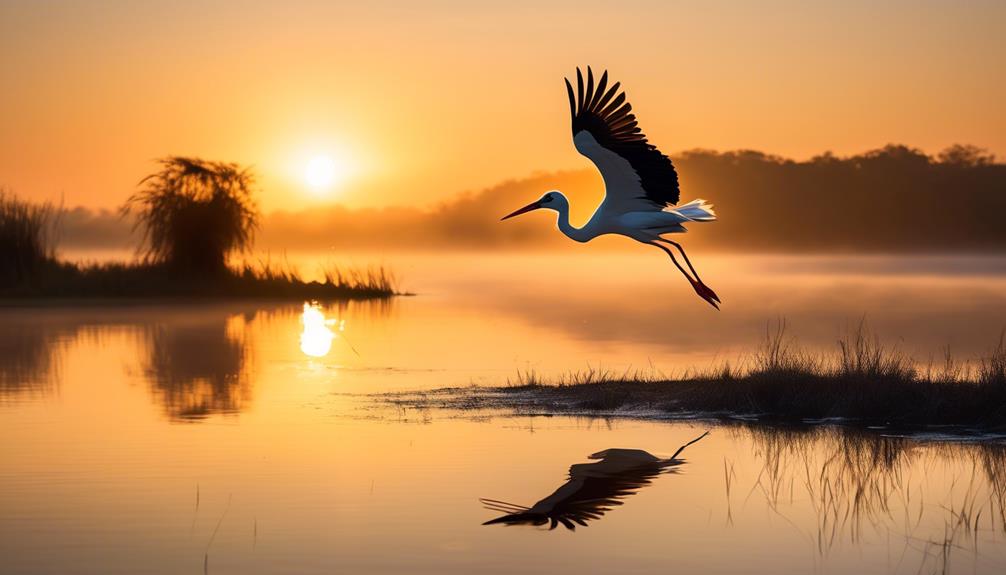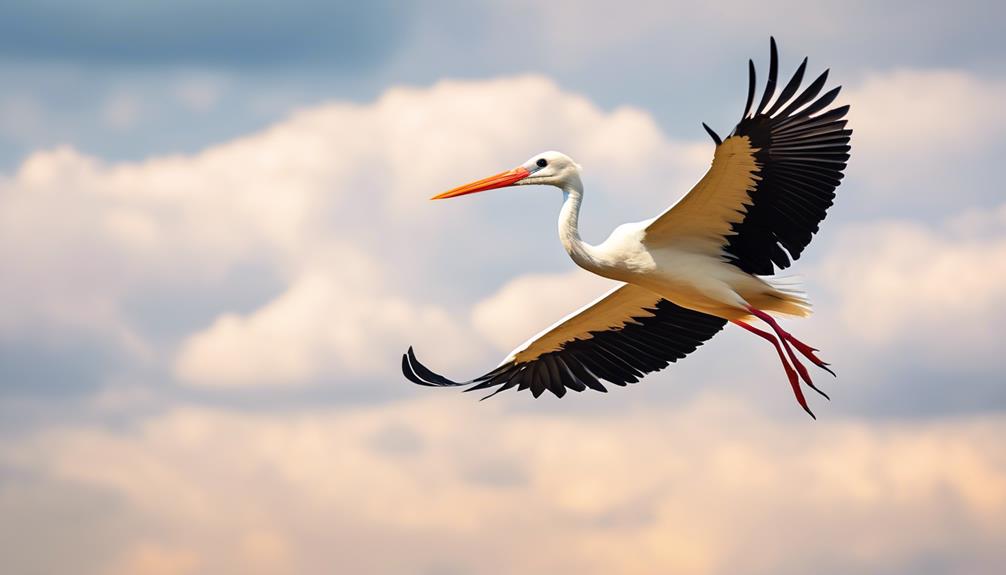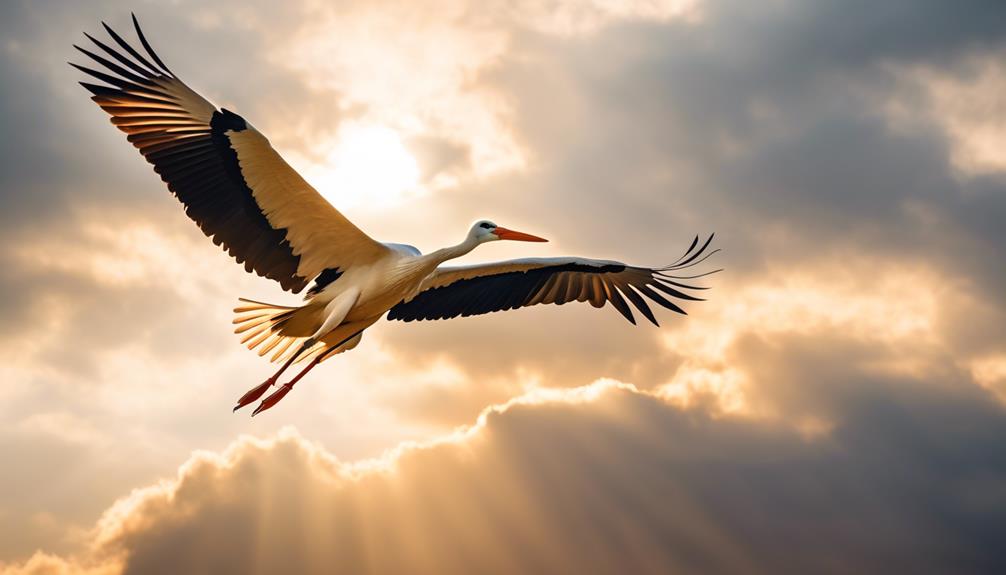As you navigate the vast landscape of spiritual symbolism, the stork emerges as a beacon of ancient wisdom and insight. Much like a sentinel standing watch over the cycle of life, the stork embodies a profound message that resonates across cultures and generations.
Its significance reaches far beyond the physical realm, delving into the depths of spiritual understanding and enlightenment. But what exactly does the stork symbolize in the realm of spirituality? And how does its timeless wisdom continue to shape our understanding of the world around us?
Stork Symbolism Exploration Beginnings

As you embark on exploring the symbolism of the stork, consider the beginnings of its significance in various cultures. The stork has long been a powerful symbol, representing new beginnings, birth, and parenthood. In many cultures, the stork is seen as a bringer of good luck and prosperity, often heralding the arrival of a new phase in life. The stork's symbolism is deeply rooted in the spiritual and symbolic meanings attached to it as a totem and spirit animal.
The stork is revered for its ability to nurture and protect its young, making it a powerful symbol of parental care and guidance. It's often associated with the concept of new life and the cycle of birth and rebirth. The stork totem is believed to bring messages of hope, renewal, and the promise of a fresh start. Its presence in various mythologies and folklore further cements its status as a powerful symbol of new beginnings and the cyclical nature of life.
In understanding the symbolic meanings of the stork, it becomes clear that this majestic bird carries profound significance across different cultures, serving as a timeless symbol of hope, fertility, and the enduring cycle of life.
Stork Symbolism in Art
Symbolizing new life and birth, storks are frequently portrayed in art as guardians of their nests and families, embodying the cycle of renewal and vitality.
In various cultures, stork symbolism and meaning in art often represents their association with good fortune and protection. In Native American art, the stork is a symbol of new beginnings and the interconnectedness of all living things. It's often depicted flying gracefully, symbolizing freedom and the spiritual journey towards enlightenment.
The portrayal of storks in art reflects their spiritual significance, as they're seen as messengers of good luck and prosperity. Whether depicted in paintings, sculptures, or other artistic forms, the stork represents the enduring bond between a mother and her offspring.
In dreams, the image of a stork in art can be a powerful symbol of hope, fertility, and the arrival of positive changes.
Stork's Significance in Psychology

The symbolism of storks in psychology reflects their universal representation of life and birth, emphasizing the psychological significance of new beginnings and nurturing aspects of the human psyche. The stork stands as a powerful symbol of renewal and vitality, granting individuals the psychological strength to embrace change and growth.
Storks return to the same nesting grounds year after year, symbolizing the psychological instinct to protect and nurture one's personal space and relationships. In psychology, the stork symbolizes the nurturing aspect of the human psyche, encouraging individuals to embrace fertility, emotional well-being, and the instinctual desire to care for others.
The stork's association with water and renewal signifies the psychological concept of emotional rejuvenation, inspiring individuals to seek vitality and embrace new beginnings. When the stork appears as a power animal or as their totem, it delivers a message of psychological resilience, creativity, and the nurturing of new ideas and opportunities.
In dreams, the stork symbolizes new beginnings, birth, and fertility, reflecting the psychological significance of embracing change and nurturing creativity.
Stork Symbolism in Nature's Cycles
In nature's cycles, storks embody the eternal rhythm of life, symbolizing birth, renewal, and the interconnectedness of all living beings. Storks are more than just animals; they represent profound spiritual symbolism in the natural world.
Here's a deeper look at their significance in nature's cycles:
- Nurturing Nature: Storks emphasize the nurturing nature of the world, reminding us of the importance of caring for each other and the environment.
- Babies and Birth: They're closely associated with the birth of babies, highlighting the miracle of life and the joyous arrival of new beginnings.
- Good Luck and Wisdom: Storks are often seen as symbols of good luck and wisdom, signifying positive energy and spiritual growth.
- Interconnectedness: They remind us of the interconnectedness of all living beings, showcasing the intricate web of life and the importance of unity.
- Totem Animal: In various cultures, storks are revered as totem animals, representing resilience, adaptability, and the ability to embrace change as an opportunity for growth.
Understanding the symbolism of storks in nature's cycles can inspire a deeper appreciation for the beauty and interconnectedness of the world around us.
Psychological Effects of Stork Symbolism

Embracing the symbolism of storks can often lead to a heightened awareness of the interconnectedness and nurturing aspects of life, fostering a sense of harmony and purpose.
The thought of storks delivered babies has a profound impact on a person's soul, evoking feelings of love, care, and responsibility. The stork is a powerful symbol of longevity and the circle of life.
The idea of delivering babies is deeply rooted in the psychological effects of stork symbolism. It can trigger thoughts about the cycle of life, the continuity of generations, and the role of nurturing in the human experience.
This symbolism also holds significance in the context of loved ones, as it reminds individuals of their responsibility to care for and protect those who are vulnerable.
Moreover, the imagery of a wounded stork can evoke feelings of empathy and compassion, prompting individuals to reflect on their own wounds and the healing process.
Ultimately, embracing the psychological effects of stork symbolism can lead to a deeper appreciation for the interconnectedness of life and the profound roles of nurturing and care.